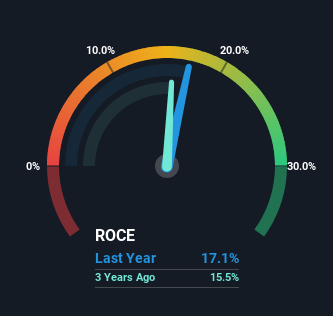Here's What's Concerning About Avadh Sugar & Energy's (NSE:AVADHSUGAR) Returns On Capital
Did you know there are some financial metrics that can provide clues of a potential multi-bagger? Firstly, we'll want to see a proven return on capital employed (ROCE) that is increasing, and secondly, an expanding base of capital employed. Put simply, these types of businesses are compounding machines, meaning they are continually reinvesting their earnings at ever-higher rates of return. Although, when we looked at Avadh Sugar & Energy (NSE:AVADHSUGAR), it didn't seem to tick all of these boxes.
Return On Capital Employed (ROCE): What Is It?
For those who don't know, ROCE is a measure of a company's yearly pre-tax profit (its return), relative to the capital employed in the business. Analysts use this formula to calculate it for Avadh Sugar & Energy:
Return on Capital Employed = Earnings Before Interest and Tax (EBIT) ÷ (Total Assets - Current Liabilities)
0.17 = ₹2.1b ÷ (₹24b - ₹12b) (Based on the trailing twelve months to June 2023).
Thus, Avadh Sugar & Energy has an ROCE of 17%. In absolute terms, that's a satisfactory return, but compared to the Food industry average of 13% it's much better.
View our latest analysis for Avadh Sugar & Energy

Historical performance is a great place to start when researching a stock so above you can see the gauge for Avadh Sugar & Energy's ROCE against it's prior returns. If you'd like to look at how Avadh Sugar & Energy has performed in the past in other metrics, you can view this free graph of past earnings, revenue and cash flow.
So How Is Avadh Sugar & Energy's ROCE Trending?
On the surface, the trend of ROCE at Avadh Sugar & Energy doesn't inspire confidence. Over the last five years, returns on capital have decreased to 17% from 27% five years ago. Meanwhile, the business is utilizing more capital but this hasn't moved the needle much in terms of sales in the past 12 months, so this could reflect longer term investments. It may take some time before the company starts to see any change in earnings from these investments.
On a related note, Avadh Sugar & Energy has decreased its current liabilities to 49% of total assets. That could partly explain why the ROCE has dropped. Effectively this means their suppliers or short-term creditors are funding less of the business, which reduces some elements of risk. Some would claim this reduces the business' efficiency at generating ROCE since it is now funding more of the operations with its own money. Either way, they're still at a pretty high level, so we'd like to see them fall further if possible.
The Bottom Line
In summary, Avadh Sugar & Energy is reinvesting funds back into the business for growth but unfortunately it looks like sales haven't increased much just yet. Investors must think there's better things to come because the stock has knocked it out of the park, delivering a 298% gain to shareholders who have held over the last five years. However, unless these underlying trends turn more positive, we wouldn't get our hopes up too high.
On a final note, we found 2 warning signs for Avadh Sugar & Energy (1 doesn't sit too well with us) you should be aware of.
For those who like to invest in solid companies, check out this free list of companies with solid balance sheets and high returns on equity.
New: Manage All Your Stock Portfolios in One Place
We've created the ultimate portfolio companion for stock investors, and it's free.
• Connect an unlimited number of Portfolios and see your total in one currency
• Be alerted to new Warning Signs or Risks via email or mobile
• Track the Fair Value of your stocks
Have feedback on this article? Concerned about the content? Get in touch with us directly. Alternatively, email editorial-team (at) simplywallst.com.
This article by Simply Wall St is general in nature. We provide commentary based on historical data and analyst forecasts only using an unbiased methodology and our articles are not intended to be financial advice. It does not constitute a recommendation to buy or sell any stock, and does not take account of your objectives, or your financial situation. We aim to bring you long-term focused analysis driven by fundamental data. Note that our analysis may not factor in the latest price-sensitive company announcements or qualitative material. Simply Wall St has no position in any stocks mentioned.
About NSEI:AVADHSUGAR
Avadh Sugar & Energy
Manufactures and sells sugar and its by-products in India.
Average dividend payer and fair value.
Market Insights
Community Narratives




